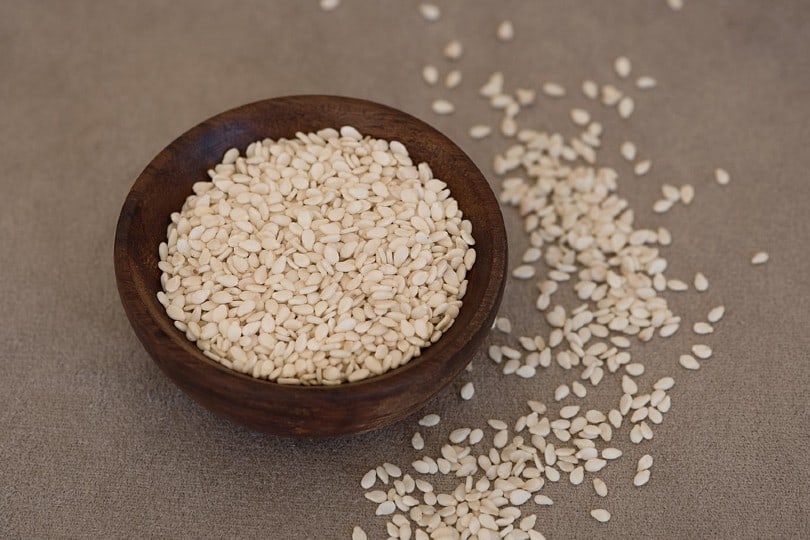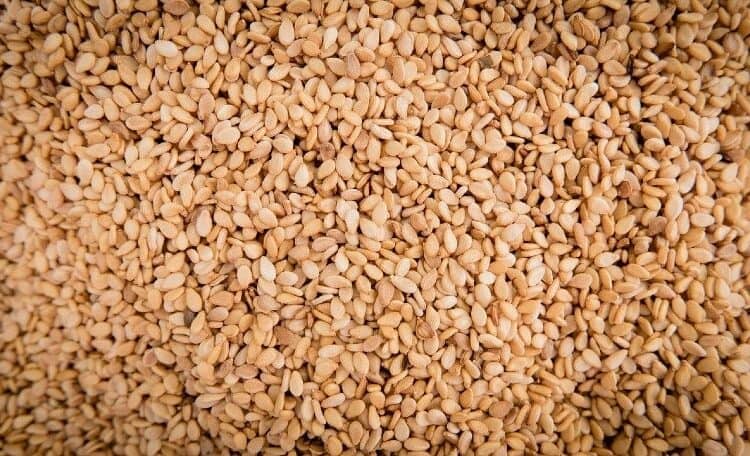Seeds and nuts are hailed by humans for their multiple health benefits, but some pose some risks to our furry friends. The question of whether sesame seeds are bad for dogs is one that’s come up more and more as pet parents look to expand their dog’s diet—particularly as they explore raw diets.
So, are sesame seeds bad for dogs?
The short answer is no, sesame seeds are not bad for dogs. They have no toxic properties. However, they aren’t a part of a natural canine diet, so they do not need to be supplemented either.
Health Benefits of Sesame Seeds
Sesame seeds contain a good amount of
- Calcium
- Iron
- Magnesium
- Phosphorus
- Potassium
- Copper
- Manganese
- Selenium
- Zinc
They’re also a good source of thiamin, riboflavin, niacin, pantothenic acid, vitamin B6, folate, and vitamin E.
A lot of good stuff, right? All these vitamins and minerals are beneficial to humans and our dogs, but the balance in sesame does align with your dog’s nutritional needs.
Possible Risks
The main concern with feeding your dog sesame seeds is the potential for gastrointestinal upset or blockage. Sesame seeds are small enough to pass through okay, but they are hard so large amounts may cause an intestinal obstruction if swallowed whole.
If you choose to feed your dog sesame seeds, be sure to do so in moderation and only in a form that has been ground or crushed. This will help to avoid any potential problems.
As with anything new, start slowly and watch for signs of gastrointestinal upset such as diarrhea or vomiting. If your dog does have any reaction, discontinue feeding, and contact your veterinarian.

My Dog Ate Sesame Seeds: What Should I Do?
Dogs are curious creatures. They’ll eat just about anything, whether it’s good for them or not. And that includes sesame seeds. So, what do you do if your dog eats a sesame seed?
First, don’t panic. Sesame seeds are not toxic to dogs, and they’re not likely to cause any serious health problems. However, they can cause digestive upset, so it’s best to keep an eye on your dog for the next 24 hours or so.
If your dog ate a lot of sesame seeds, you may see some vomiting or diarrhea. This is normal and nothing to worry about.
Alternative Seeds
Seeds are not necessary for a dog’s diet as they don’t align with their natural consumption. They can be added to a raw diet on rare occasions but opt for more suitable seeds than sesame.
There are plenty of other seeds that you can safely feed your dog as a treat or supplement to their diet. Some of the best seeds for dogs include:
- Chia seeds
- Flaxseeds
- Hemp seeds
- Pumpkin seeds
All these seeds offer health benefits for dogs and are unlikely to cause any digestive upset.
What to Avoid
There are some seeds that you should avoid feeding your dog, as they can be toxic. These include:
- Apple seeds
- Apricot kernels
- Cherry pits
- Plum pits
- Peach pits
These seeds contain cyanide, which is poisonous to dogs (and humans). If your dog eats any of these seeds, contact your veterinarian immediately.

What About Sesame Oil?
Sesame oil is safe for dogs and can be used to help improve their coat and skin health. It’s also a good source of essential fatty acids, which are important for a healthy diet.
If you do choose to use sesame oil on your dog, be sure to do so in moderation.
However, sesame is not the top oil pick for canine supplementation. To add some oily shine to your dog’s coat, consider these oils instead, and don’t forget to get clearance from your vet.
- Fish oil
- Krill oil
- Coconut oil
- Flaxseed oil
The Bottom Line
While sesame seeds are not bad for dogs, they’re not particularly good for them either. They offer some health benefits, but they’re not a necessary part of a dog’s diet. If you choose to feed your dog sesame seeds, do so in moderation and consider crushing or grinding them.
Featured Image Credit: Pixabay














